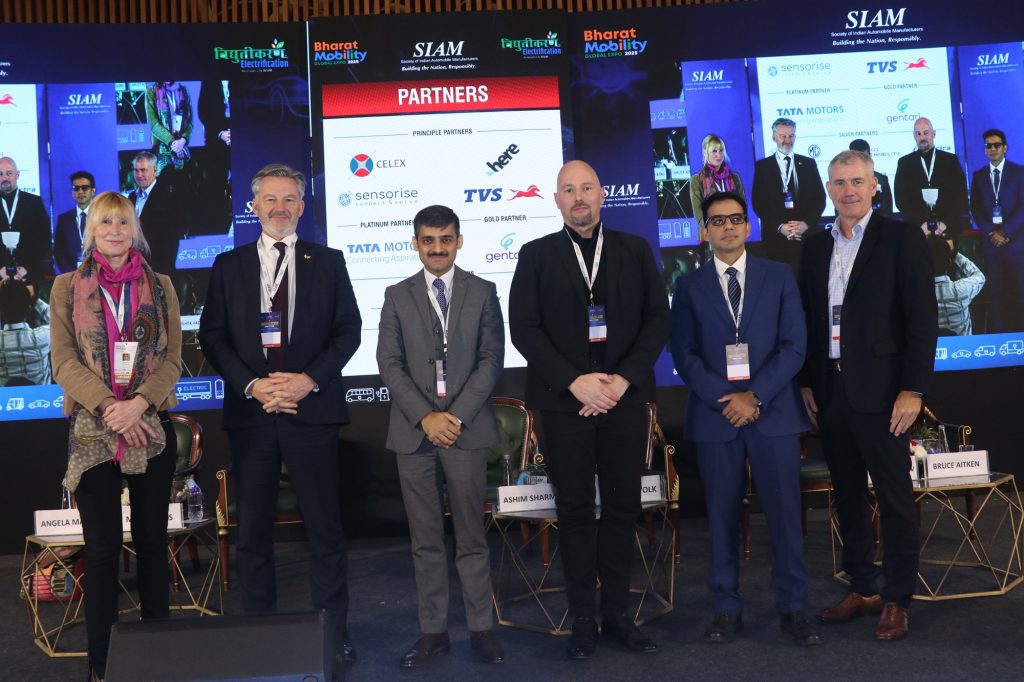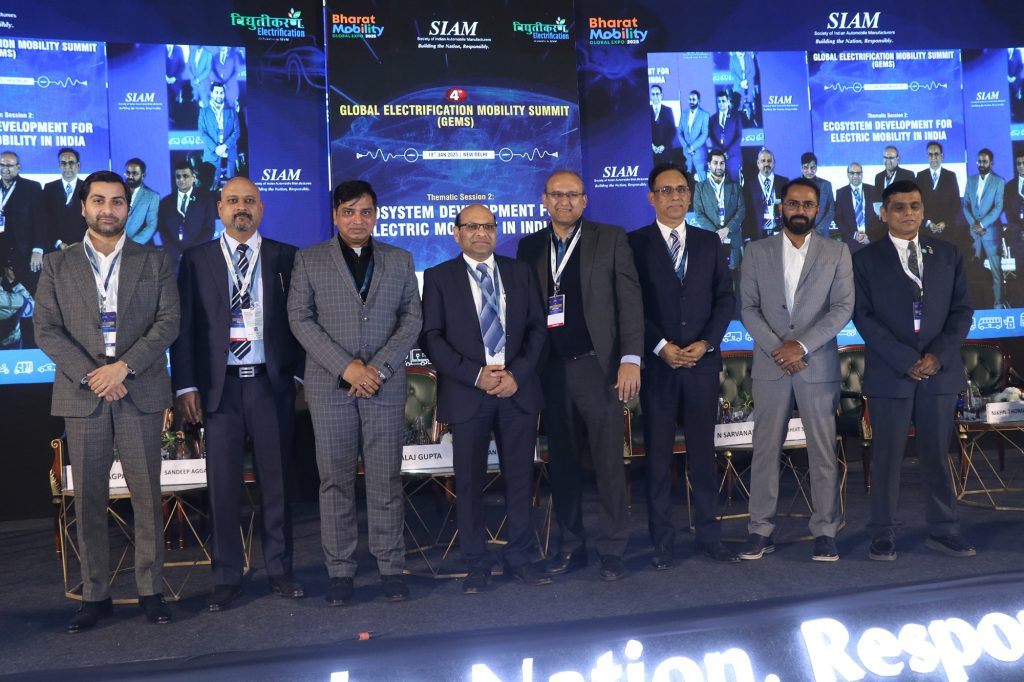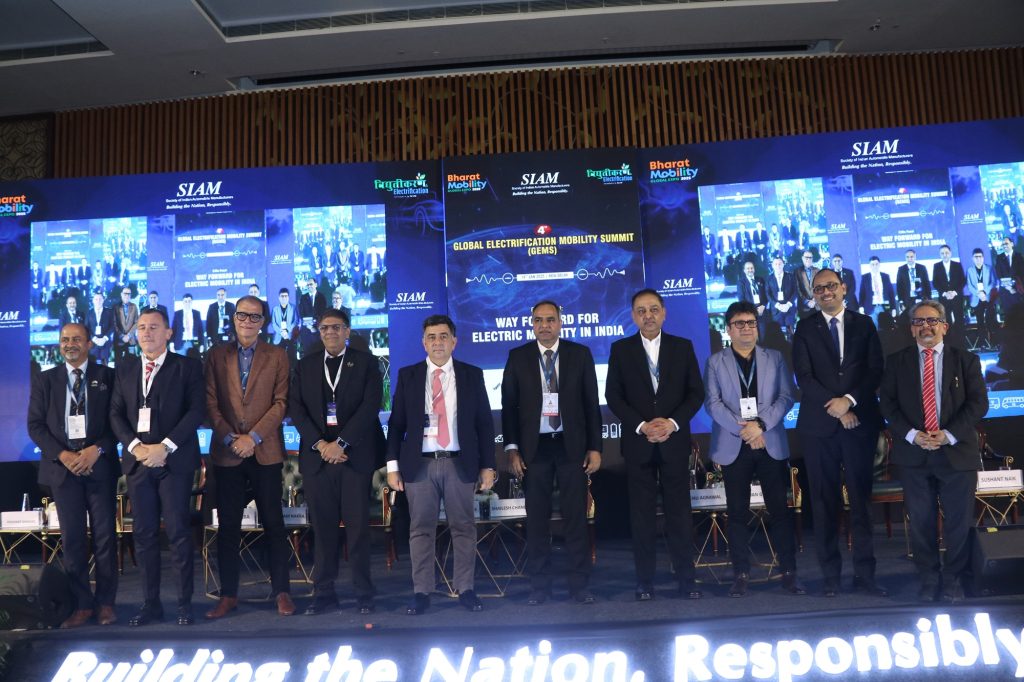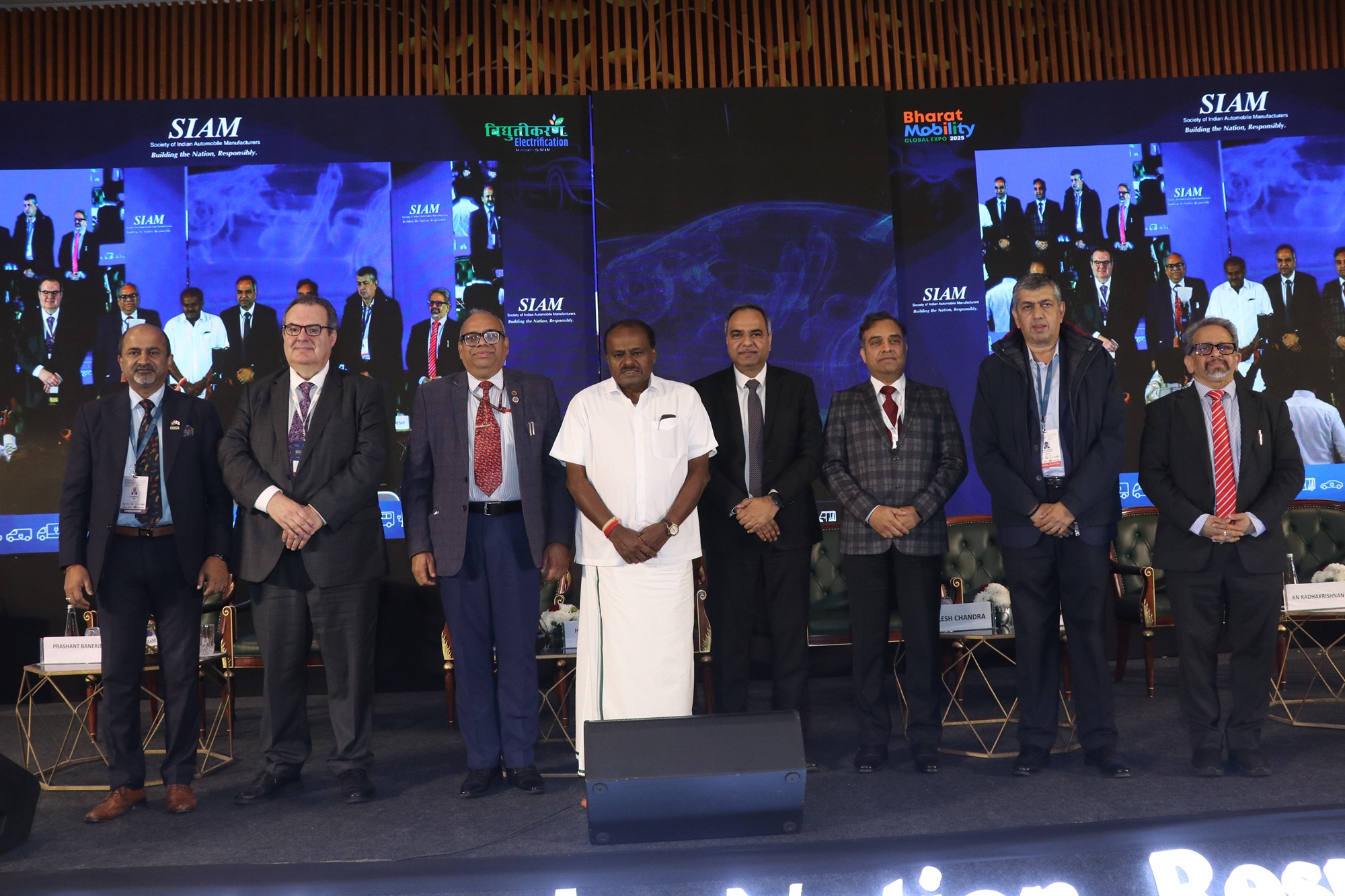New Delhi, January 19, 2025: The Society of Indian Automobile Manufacturers (SIAM) successfully organized the 4th Global Electrification Mobility Summit (GEMS), themed “Electrification: Powering India’s EV Leap, Reaching the Tipping Point”, at Bharat Mandapam, Pragati Maidan, New Delhi, on the sidelines of Bharat Mobility Global Expo 2025. The summit brought together policymakers, global industry leaders, and experts to chart the way forward for India’s electric mobility transformation.
The event was graced by the presence of Chief Guest, Shri H.D. Kumaraswamy, Hon’ble Minister of Heavy Industries and Steel, Government of India, and Guests of Honour Mr. Sudhendu J. Sinha, Advisor, NITI Aayog and Dr. Hanif Qureshi, Additional Secretary, Ministry for Heavy Industries, Government of India, along with Secretary General of Association of World Manufacturers and leading industry leaders.
The inaugural session, themed “Electric Vehicles for a Green Future Powered by a Conducive Policy Framework”, witnessed discussions around EV policies, offering deep insights for development of future policy frameworks that would accelerate EV adoption in India.
Welcoming the dignitaries, Mr. Prashant K Banerjee, Executive Director, SIAM,.said, “The Bharat Mobility Global Expo 2025 marks a watershed moment for India’s transportation sector, and India is marching towards electrification and sustainable mobility.”
While addressing the summit, Hon’ble Chief Guest Shri H.D. Kumaraswamy said, “In the last few years, the Government has taken several significant steps towards promoting electric mobility in the country.Through schemes like FAME, EMPS and PLIs for automobiles and auto component and ACC batteries, we have propelled the industry towards sustainable advanced technologies. The PLI scheme with an investment of over INR 25,900 crore worked as a catalyst. Since its launch it has attracted investment of over INR 27,000 crore and created over 28,500 jobs.”
Discussing the country’s EV leap, Guest of Honour Mr. Sudhendu J. Sinha, Advisor, NITI Aayog, remarked, “Over the past nine years, transformative initiatives such as FAME, FAME II, PM E-DRIVE, and PLI schemes have collectively channelled an impressive $15 billion into electric mobility. The industry has responded enthusiastically, with close to 5.5 million EVs on roads today.”
Guest of Honour Dr. Hanif Qureshi, Additional Secretary, Ministry for Heavy Industries, highlighted, “India has the potential to lead the world with top-quality electric vehicles. Clean transformation, with special focus on EV industry, is the central focus of the Government. We must focus on exports and localization of EVs. Customers want better vehicle quality yet at cheaper prices. This requires enhanced investments in R&D, affordable solutions, and innovative models.”
Mr. Francois Roudier, Secretary General, the International Organization of Motor Vehicle Manufacturers (OICA), said, “Software design vehicles (SDV) powered by AI will be the backbone of the electric automotive industry going forward. Sophisticated driver assistance will create new business models. India is home to many software startups and R&D centers. By aligning its IT centers, India can cater to demand of the automotive industry.”
Mr. Shailesh Chandra, President, SIAM, and Managing Director, Tata Motors Passenger Vehicles & Tata Passenger Electric Mobility, said, “The Indian Auto Industry needs to be at the forefront of India’s net zero journey. The shift to EVs reduces India’s dependency on fossil fuels and increasing energy security. India’s EV growth story has been underpinned by ecosystem building efforts. SIAM’s Vidyutikaran initiative has been pivotal to drive EV adoption in the country.”
Mr. K N Radhakrishnan, Director, & CEO, TVS Motor Compnay, said, “India has a global benchmark in the two-wheeler industry and is witnessing transformative growth driven by innovative products and expanding EV penetration. With world-class infrastructure, a young demographic, and support from the government, the sector continues to thrive across the entire supply chain. By investing in talent, design, and manufacturing excellence, Indian OEMs are poised to make ‘Brand India’ two-wheelers a global phenomenon, marking a massive transformation in mobility.”
Mr. Sushant Naik, Chairman, SIAM Electric Mobility Group & Global Head, Government & Public Affairs, Tata Motors, said, “India is poised to become a global manufacturing hub, with a bold commitment to net zero by 2070. India is committed to accelerating efforts towards electrification of the transportation sector while driving innovation, developing charging infrastructure, and skill enhancement of the workforce.”

The Thematic Session-1, themed “Imperatives for India and Global Learnings for Further Growth in the EV Industry”, was chaired by Mr. Ashim Sharma, Senior Partner, NRI Consulting & Solutions. The session witnessed insightful presentations by Mr. Mike Hawes, CEO, the Society of Motor Manufacturers and Traders (SMMT), United Kingdom, on “Markets and Mandates: The UK’s EV Adoption Journey”, Ms. Angela Mans, German Association of Automotive Industry-VDA, Germany, on “Learnings from Germany’s Automotive Electrification Journey”, Mr. Abhishek Yadav, Co-founder and COO, iMOTO, Indonesia, on “Growth Strategies for Electric Two Wheelers from South Asian Market”, Mr. Andreas Volk, CEO, Bet Motors, Austria, on “Driving Innovation: Leveraging BET-Motors for Long-Haul Trucks and Next-Generation Mobility Solutions”, and Mr. Bruce Aitken, CFO, Gogoro, China, on “Battery Swapping Solutions for EVs”. The session provided key insights into global EV practices and how innovations are advancing EV technologies.

The Thematic Session-2, themed “Ecosystem Development for Electric Mobility in India” was chaired by Mr Vipin Surana, Co-Chair, SIAM Electric Mobility Group, and VP, VE Commercial Vehicles. Mr. Kavan Mukhtyar, Partner and India Automotive Sector Leader, PwC, set the context with an engaging presentation.
The session further witnessed some keynote presentations from Mr. V Manjunath, Regional Standards Manager- South Asia and Sub-Saharan Africa, at UL Standards & Engagement Inc. (ULSE), on “Strategies for Building a Sustainble and Scalable Charging Ecosystem”, Dr. N Sarvanan, CTO, Ashok Leyland, on “Electrifying Fleets: Transforming the Future of Commercial Mobility”, Mr. Karn Nagpal, President, Sensorise, on “Harnessing IoT and M2M for Electric Vehicle Evolution”, Mr. Sandeep Aggarwal, CEO, Celex Technologies, on “Technology Innovations in Vehicle Registration Plates”, Mr. Nikhil Thomas, CEO, Green Mobility, Gentari India, on “Emerging Business Models in the E-Mobility Ecosystem”, Mr. Abhijit Sen Gupta, Senior Director & Head of Business (India & Southeast Asia), HERE Technologies, on “Charting the Road to Electrification with Transformative Location Technologies”, and Mr. Jalaj Gupta, Managing Director, TI Clean Mobility, on “Innovative Battery Chemistries: Securing Raw Materials and Developing Affordable Electrified Vehicles”. The session discussed strategies to develop a conducive ecosystem for electric mobility in India.

Featuring the who’s who of the Auto Industry, the last session, themed “CXOs Panel: Way Forward for Electric Mobility in India” was moderated by Mr. Hormazd Sorabjee, Editor, Autocar India.
Mr. Shailesh Chandra, President, SIAM, and Managing Director, Tata Motors Passenger Vehicles & Tata Passenger Electric Mobility, said, “The customer was in a bit of confusion due to some headwinds, but now with all manufacturers coming out with good products, this is possibly the inflection point in the EV industry.”
Mr. Shenu Agrawal, Vice President, SIAM and MD & CEO, Ashok Leyland, said, “Technology has to provide the answers in the long run. We have to have a minimum of 300 KM range; charging time and cost have to decrease. Until the product solutions are available, we need to find an ecosystem solution.”
Mr. Veejay Ram Nakra, Chairman, SIAM PV CEOs Council, and President, Auto Division, Mahindra & Mahindra, said, “If you look at market trends that have played out in the last couple of years, the larger trend has been about aspirations. We are an economy on the run. People’s aspirations are growing. They expect futuristic vehicles. For EV industry, right now it is not about market share but category growth.”
Mr. Santosh Iyer, MD & CEO, Mercedes-Benz India, said, “Price-value proposition is the greatest motivation for the customer. OEMs face challenges of incurring development costs for two to three powertrains. A clear roadmap will help the industry make wiser investment for cleaner future.”
Mr Niranjan Gupta, CEO, Hero MotoCorp, said, “Procuring raw materials remains a challenge for localization in India. While Indian Government is supporting industry with PLI scheme for Automobiles and Advanced Batteries, India can focus towards refining of raw rare earth materials like Lithium. The industry needs to focus on improving material efficiency, which can be achieved by encouraging recycling.”
Mr. Diego Graffi, Chairman, SIAM 3W CEOs Council and Chairman & MD, Piaggio Vehicles, said, “The Government has played its role; its incentives have created the demand. The requirement now is of public charging infrastructure, battery capacity, and other services like battery-as-a-service which can increase the EV penetration in three-wheeler category.”
Mr. Rajeev Chaba, Managing Director, JSW MG Motor India, said, “The EV journey is an evolution. This junction is like the “Mutual Fund Sahi Hai” moment for the EV industry. India is a diverse market; and we cater to different kinds of needs.”
The session highlighted the criticality of innovative strategies to achieve India’s electrification goals. Mr. Sushant Naik, Chairman, SIAM Electric Mobility Group, concluded the day-long event with his closing remarks.
Over the years, SIAM has engaged with governments, corporations, and various stakeholders in an effort to advocate a transition to cleaner fuels and innovative technologies. These engagements are aligned with SIAM’s objective of ‘Building the Nation Responsibly’ and nurturing sustainable mobility and sustainable development goals, 2030.











